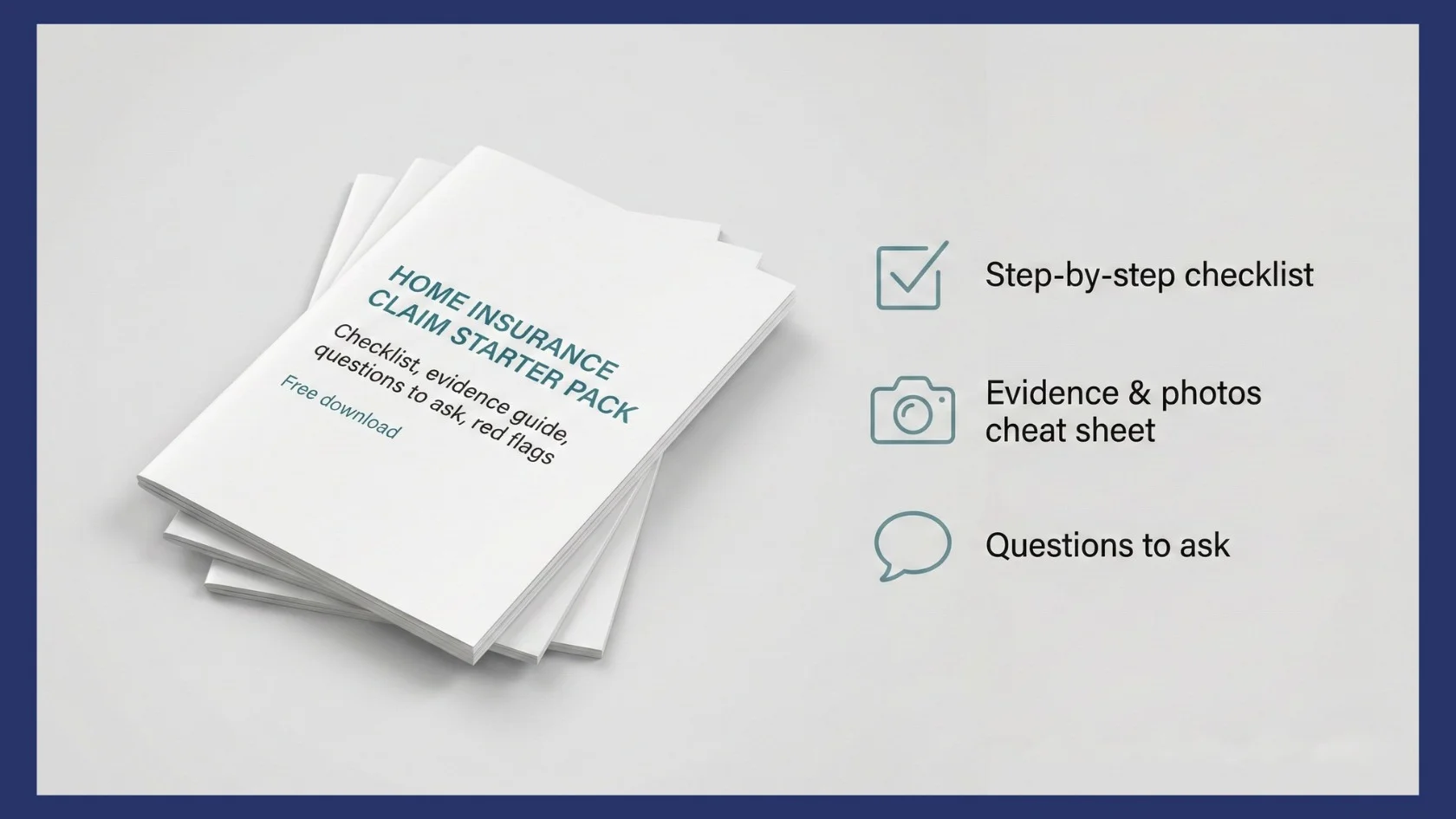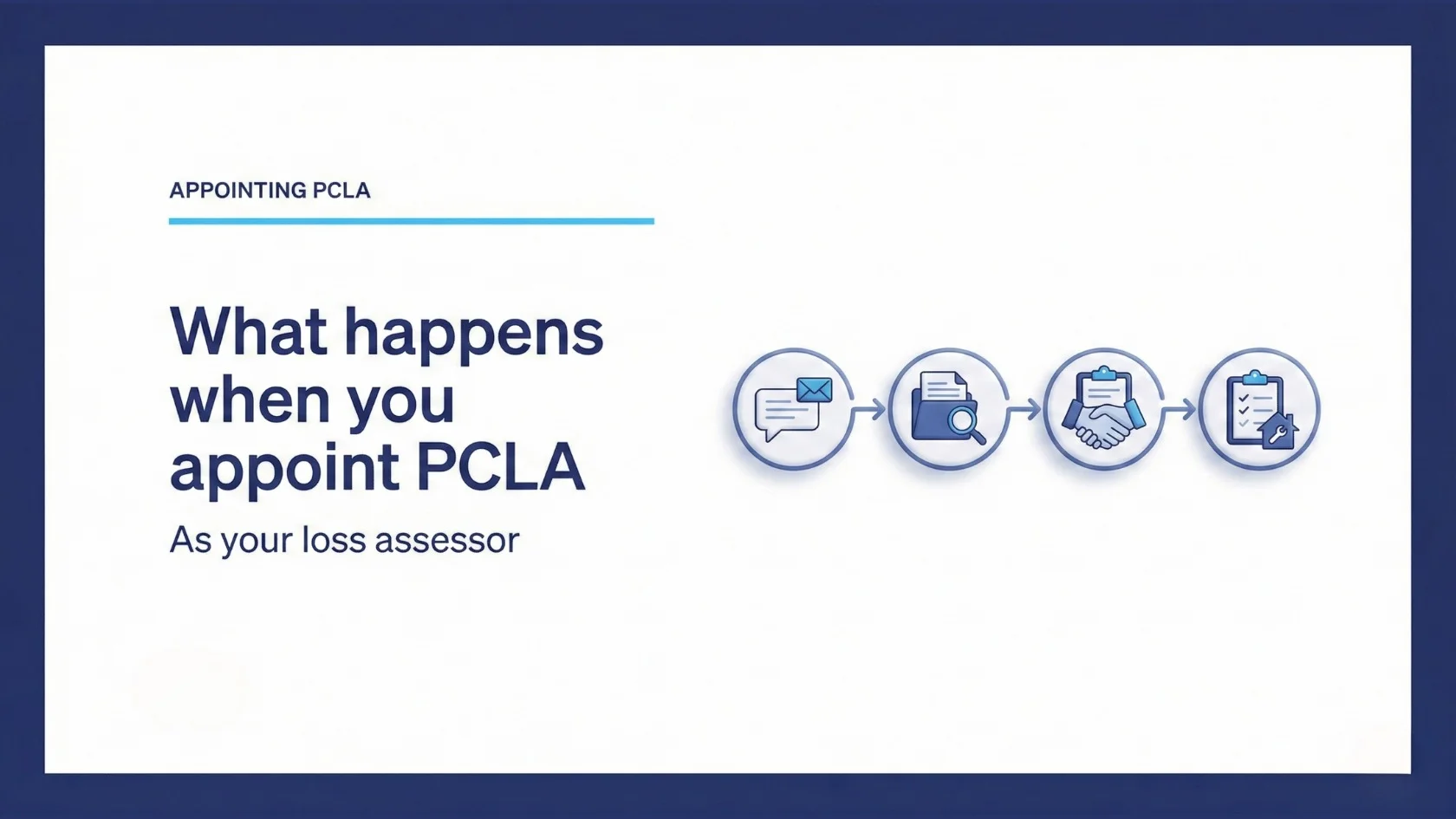A loss assessor works for you (the policyholder), not the insurer, helping you value damage, prepare evidence, and negotiate a settlement. If you’re searching “loss assessor”, you may be wondering whether the fee is worth it and who actually pays. Here’s how fees usually work in the UK and when appointing one can improve your outcome.
Key Takeaways
- Loss Assessors advocate for policyholders, ensuring claims accurately reflect the true value of the loss, whereas Loss Adjusters represent the interests of insurers.
- Fees for Loss Assessors are typically covered by the insurance settlement, making them a cost-effective choice.
- Hiring a Loss Assessor can improve claim outcomes, particularly for complex or significant property damage claims.
- Their expertise in negotiation often results in settlements that are higher than the initial offers made by insurers.
What is the Difference Between a Loss Assessor and a Loss Adjuster?
When navigating the often murky waters of insurance claims, it’s vital to understand the distinct roles of a Loss Assessor and a Loss Adjuster.
A Loss Assessor champions the policyholder’s interests—think of them as your personal insurance advocate.
In contrast, a Loss Adjuster typically represents the insurance company’s perspective, evaluating claims to minimise their payout.
To summarise, one is your ally in the claims process, while the other acts more like a friendly referee.
Both are important, but knowing who’s on your side can make all the difference.
Understanding the Role of a Loss Assessor
A Loss Assessor serves as an advocate for the policyholder, in stark contrast to a Loss Adjuster, who represents the interests of the insurance company.
So, who is a Loss Assessor?
Essentially, they are your champions during the often intimidating insurance claims process.
What does a Loss Assessor do?
They manage everything from paperwork to negotiations, ensuring your claim is not just a mere number but a fair reflection of your losses.
Why use a Loss Assessor?
Because navigating the complex world of insurance claims can feel like a labyrinth. Hiring one can expedite the process and alleviate your stress.
You might wonder if you need to hire a Loss Assessor straight away. The sooner, the better! Early involvement can make a significant difference in the outcome.
Now, how do Loss Assessors get paid?
Many work on a “no win, no fee” basis, meaning they only charge you once your claim has been settled, making it a risk-free choice for you.
At its core, having a Loss Assessor by your side turns the often overwhelming claims process into a more manageable experience, where your interests are prioritised. And who wouldn’t want that?
Understanding the Role of a Loss Adjuster
Understanding the distinction between a Loss Assessor and a Loss Adjuster is crucial for policyholders navigating the insurance claims process. These roles are essential yet often misunderstood, leading to confusion during critical times.
Here are a few key points to consider:
- Different representation: Loss Assessors represent the policyholder, whereas Loss Adjusters work for the insurance company.
- Negotiation power: Loss Assessors negotiate for a fair settlement, using their knowledge of insurance policies.
- Stress reduction: Engaging a Loss Assessor can alleviate the claims process, allowing you to concentrate on recovery rather than paperwork.
Many policyholders wonder, ‘Who pays a Loss Assessor?’ Generally, their fees are covered by the settlement, making it a prudent investment.
If you’re asking, ‘Should I get a Loss Assessor?‘ the answer is often yes, especially for significant claims. A Loss Assessor provides valuable guidance and ensures you receive what you’re entitled to. Accept the support; it can make all the difference!
Key Difference Between a Loss Adjuster and a Loss Assessor
The distinction between a Loss Adjuster and a Loss Assessor primarily lies in their representation and objectives within the insurance claims process. A Loss Adjuster works for the insurance company, evaluating claims to protect the insurer’s interests.
In contrast, a Loss Assessor is your ally, dedicated to advocating for you, the policyholder. They are experts in claim negotiation, ensuring you receive a fair settlement that truly reflects your losses.
If your claim involves significant damage or complexity, having a Loss Assessor by your side can be invaluable. They handle everything, from assessing damage to presenting your claim professionally.
Imagine navigating the claims process on your own—daunting, isn’t it? A Loss Assessor makes it smoother and less stressful, ensuring you don’t overlook critical details.
Who Pays for a Loss Assessor?
Typically, policyholders bear the initial cost of hiring a Loss Assessor.
As for how much loss assessors charge, fees can vary widely based on the complexity of the claim and the experience of the assessor. At PCLA, our professional fee is 10% of the settlement amount plus VAT.
So, do I have to pay a loss assessor?
In many cases, the answer is yes, but it is worth discussing your options with your assessor to understand if there are ways to offset these costs.
Finally, the value they provide in managing the claims process often outweighs the initial expenditure.
Is it Worth the Expense of a Loss Assessor?
Evaluating the expense of hiring a Loss Assessor often hinges on the potential benefits they can provide in maximising insurance claims. Many policyholders wonder, “Do I need a loss assessor?” or “What does a loss assessor cost?”
The truth is, these professionals can be invaluable in making and managing an insurance claim, especially when the stakes are high.
Here are some compelling reasons to consider:
- Expertise in negotiating the best settlement
- Thorough damage assessment to ensure no detail is missed
- Representation focused solely on your interests
How Can a Loss Assessor Help With Your Insurance Claim?

Managing a complex insurance claim can feel like trying to find your way out of a maze, but that’s where a Loss Assessor steps in as your guiding light.
From managing paperwork to negotiating the best possible settlement, they offer a comprehensive suite of services designed to make the process smoother and less stressful.
Whether you require expert advice on your policy or assistance coordinating repairs, enlisting a Loss Assessor can transform a challenging experience into a more manageable one, allowing you to focus on what truly matters—your recovery.
Services Offered by a Loss Assessor
A Loss Assessor offers a range of essential services designed to support policyholders throughout the insurance claim process, ensuring that their interests are prioritised and claims are handled efficiently. Manoeuvring through the complexities of insurance claims can feel overwhelming, but a Loss Assessor is here to help lighten the load.
- Claim Management: They take care of the paperwork and logistics, allowing you to focus on what really matters—your recovery.
- Policyholder Representation: Acting solely on behalf of the policyholder, they advocate for your rights, unlike Loss Adjusters who represent the insurer.
- Claim Negotiation: With their expertise in policy terms, they negotiate with insurance companies to secure the best settlement possible.
Additionally, their expert advice on policy interpretation can demystify the process, providing you with clarity and confidence. Whether you’re dealing with storm damage or a fire, having a Loss Assessor by your side turns a formidable challenge into a manageable journey, offering reassurance every step of the way.
How to Appoint a Loss Assessor?
Engaging a Loss Assessor can significantly enhance the effectiveness of your insurance claim by providing expert guidance and representation throughout the process.
So, how do you find the best loss assessor near you?
Start by researching reputable professionals in your area or asking friends and family for recommendations. Remember, a loss assessor is your ally, working for you, not the insurance company.
When might a loss assessor be appointed?
If you’re facing complex claims—such as fire or flood damage—they can be invaluable. Their role encompasses comprehensive claim management, ensuring that every aspect is meticulously handled.
The essence of what a loss assessor does lies in their ability to provide policyholder representation. They’ll assess the damage, prepare your claim, and negotiate with insurers to secure a fair settlement. This means you can focus on what matters most: recovering from your situation.
If you’re feeling overwhelmed, don’t hesitate to reach out to a loss assessor. They can alleviate stress and help you navigate this often-challenging process with confidence. After all, you deserve the best support possible during such trying times!
Ensuring You Get the Best Claim Settlement
Using the expertise of a Loss Assessor can significantly enhance your chances of securing a favourable settlement for your insurance claim. When navigating the often convoluted world of insurance, having a professional in your corner can make all the difference.
Here’s how a Loss Assessor can assist with your claim:
- Claim Management: They handle the entire process, allowing you to focus on what truly matters.
- Policyholder Representation: Unlike Loss Adjusters, they work solely for you, ensuring your best interests are prioritised.
- Claim Negotiation: With their experience, they secure the best possible outcome, often exceeding initial offers.
With a Loss Assessor by your side, you benefit from their ability to navigate complex claims. They’ll take the lead in claim negotiation, providing policyholder representation that truly advocates for your needs.
Think of them as your personal claim champion—making the process smoother and less stressful. So, why go it alone? Engage a Loss Assessor for expert advice and a better chance at a satisfactory settlement. It’s one decision you won’t regret!
When Should You Consider Using a Loss Assessor?

If you have experienced a fire, flood, or any major property incident, considering a Loss Assessor might just be your secret weapon.
They not only simplify the process but also ensure you’re not leaving money on the table—because who wouldn’t want a bit of extra peace of mind during such a chaotic time?
Situations That Need a Loss Assessor
In various scenarios involving significant property damage, it becomes essential to consider the expertise of a Loss Assessor to ensure a thorough and effective claims process. Understanding when to engage a Loss Assessor can be the key to navigating the often turbulent waters of claim management.
- Severe Property Damage: If your home has suffered from fire, flood, or storm damage, expert assessment is critical.
- Complex Claims: When your claim involves intricate details or substantial sums, a Loss Assessor can ensure that nothing is overlooked.
- Disputes with Insurers: If negotiations with your insurance company are becoming contentious, their advocacy through policyholder representation is invaluable.
For those wondering, ‘What is a Loss Assessor?’—they are professionals who work exclusively for you, the policyholder. They are regulated to uphold standards, providing peace of mind during stressful times.
Benefits of Using a Loss Assessor
Engaging a Loss Assessor can significantly enhance the efficiency and effectiveness of the claims process, particularly in scenarios involving considerable property damage or intricate claims. They adeptly manage claim procedures, ensuring you aren’t overwhelmed by paperwork, and offer policyholder representation, advocating solely for your best interests.
Here’s a quick overview of the benefits:
| Benefit | Description | Impact |
|---|---|---|
| Expert Advice | In-depth knowledge of policies and entitlements | Maximises your claim value |
| Claim Negotiation | Proficient negotiation with insurers | Achieves a fair settlement |
| Damage Assessment | Comprehensive evaluation of property damage | Guarantees nothing is overlooked |
How a Loss Assessor Ensures You Receive the Best Possible Outcome
Did you know??? A Loss Assessor can significantly influence the outcome of an insurance claim, particularly when the complexities of property damage arise. Here’s how they can make a difference:
- Policyholder Representation: They champion your cause, standing firmly by your side.
- Claim Negotiation: As skilled negotiators, they ensure you aren’t shortchanged during discussions.
- Expert Advice: With their extensive knowledge, they clarify your entitlements under the policy.
So, what is a loss assessor in insurance? Fundamentally, they act as your advocate, navigating the often murky waters of claims.
If you’re wondering how to become an insurance loss assessor, it typically involves training in claims management and negotiation skills.
In situations where damage is substantial—think floods or fires—their involvement can be invaluable. By guaranteeing thorough damage assessments and effective claim preparation, they help enhance your settlement.
What is the Process to Appoint a Loss Assessor?

Appointing a Loss Assessor can feel a bit like assembling a dream team for your insurance claim—after all, you want the best on your side!
The process typically begins with researching qualified professionals who specialise in your type of claim, followed by an initial consultation to discuss your specific needs.
Once you’ve found the right fit, the next step is to formally engage their services, ensuring you have someone who will advocate for you while you focus on getting back on your feet.
Steps to Appoint a Loss Assessor
Selecting a Loss Assessor involves a systematic approach to ensure the right professional is chosen to effectively manage your insurance claim. Navigating the complexities of insurance can feel overwhelming, but you don’t have to do it alone!
Here are some steps to guide you:
- Research Credentials: Ensure you verify whether loss assessors are regulated. Some may ask, do loss assessors need to be regulated by the FCA?
- Check Experience: Look for professionals with a proven track record in handling claims similar to yours. What does a PLA Loss Assessor do? They specialise in representing policyholders, so their expertise is crucial.
- Review Testimonials: Client feedback can provide insight into their reliability and effectiveness, helping you feel more confident in your choice.
Ultimately, understanding what a loss assessor is and how they operate will empower you.
With the right support, reclaiming your peace of mind after a loss can become a smoother experience. Cheer up, you’ve got this!
Conclusion
Engaging a Loss Assessor can significantly streamline the often daunting insurance claims process, ensuring that the interests of policyholders are robustly represented.
While costs may vary, many policyholders find that these professionals can be accessed without upfront fees, particularly when working with recommended contractors.
Weighing the benefits and timing of their services can lead to a more favourable outcome, transforming an overwhelming experience into a manageable one.
Ultimately, the decision to enlist a Loss Assessor should align with individual circumstances and needs.



